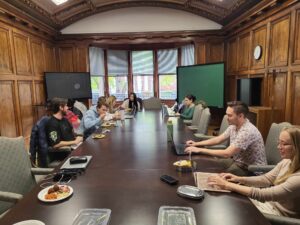
by Carson Cook, Eva Boghosian and Hannah West
As members of the 2023-2024 Environmental Rights Student Working Group at the David Asper Centre for Constitutional Rights, eleven first year students at the University of Toronto Faculty of Law have been researching various legal doctrines, legislation, and case law related to how environmental rights are conceived in Canada, how they can be used/acted upon, and how they might be improved. Their research has covered environmental constitutional litigation like Mathur v Ontario; how Indigenous rights and knowledge interact with environment law; and, legal doctrines from other jurisdictions that provide environmental protection. The outcome of this research will be a guidebook that informs community organizers and activists of the state of environmental rights within Canada.
To take part in the Global Day of Action for Climate Justice, we asked these students to reflect on their research and the potential for climate action within Canada. A common theme, and perhaps a surprising one, was positivity surrounding Canada’s ability to pursue climate action within its legal framework. Though the students identified various issues of implementation, they appreciated finding processes within the Canadian legal system that can support environmental protection and climate action. Students also valued their research as it provided them with an opportunity to learn about other jurisdictions and the processes used internationally that could be adopted within Canada. Though, in addition to issues of implementation, the students noted the legal system only moves in small steps. However, the students noted they felt more empowered to think about furthering climate action with their new knowledge of these environmental legal frameworks.
Another recurring insight from the students was how important education for the general public is for meaningful climate action – highly relevant to the Environmental Rights Working Group’s goal of creating a guidebook for lay-people to understand their legal rights with respect to the environment. As law students and future lawyers, we are in positions of privilege to have the tools and training to research complicated theories and frameworks that greatly affect how climate action is pursued, and we therefore have a duty to help educate those around us. Importantly, the students noted, this education should not simply be providing information, but conducted in a way that empowers people – to build their skills, knowledge, and confidence so that they can work and learn in the environmental space to further change.
Such education builds power for all of us to push for change, as legal professionals or otherwise. This was the final theme from our reflection session with the student researchers – the importance of an analysis of power when working for climate justice. While legal processes can be and have been created to further environmental protection, those processes can be subverted when there is a power imbalance between adversarial parties. While law affects social values, social values also affect the law. The collective power of a community asking for change or participating in decision-making processes is key for climate action to occur. This is not to pin the causes of climate change on individuals, but it is to recognize the agency and power we each hold, and that builds when we work together to tackle otherwise insurmountable problems. The Environmental Rights Working Group has been one small way in which we, as law students, are building power within ourselves, amongst each other, and within our Toronto community.
Carson Cook, Eva Boghosian and Hannah West are JD Candidates at the Faculty of Law and are the Asper Centre Environmental Rights Working Group leaders this year.
